Essay On Religion In Schools (Structure/Outline)
- Introduction
- Religion in Curriculum
- Guidelines for teaching Religion in Schools
- Harassment Based On Religion
- Religious Accommodation for Students
- Students’ Rights about religion
- Free Speech
- Rights of Teachers about Religion
- FAQS
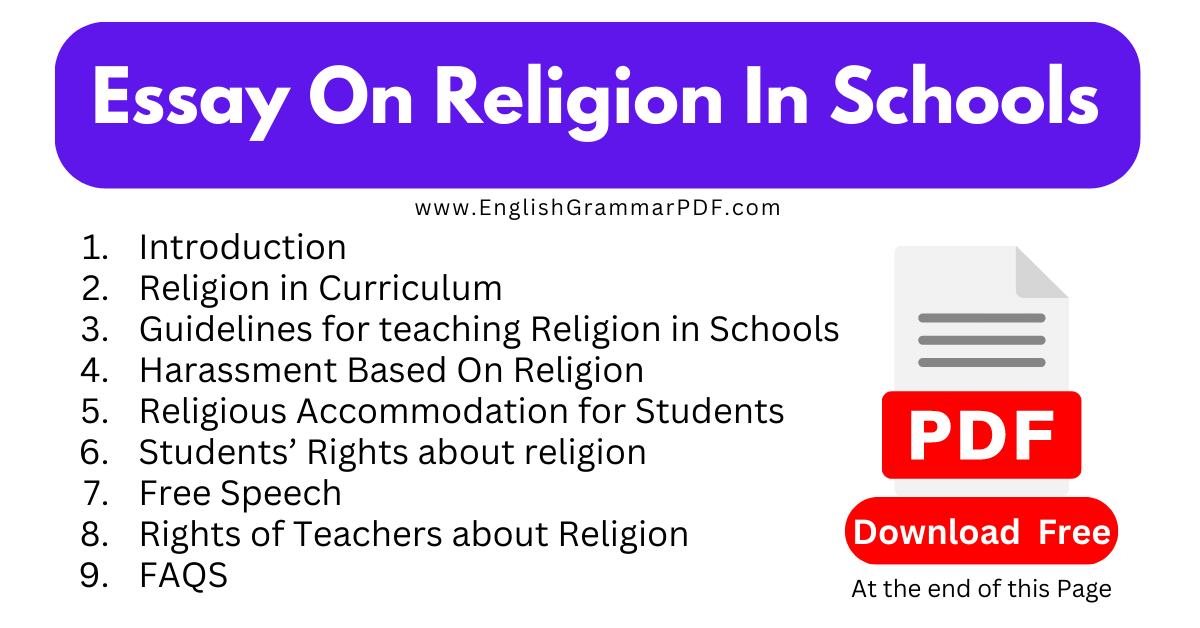
Introduction
Religion in schools has long been a controversial topic, stirring passionate debates on both sides of the argument. Learning about different religions can also have a positive influence on students’ ethical outlook and their behavior toward other cultures. On the other hand, some are concerned that teaching about different faiths can lead to proselytizing or indoctrination.
Religion can be a touchy subject for many people and it is important to properly educate students while respecting all beliefs. Furthermore, administrators must address religious freedoms and ensure these are protected within the school system in order to maintain an environment of inclusivity and acceptance.
Religion in Curriculum
It is noteworthy to discuss how religion can be incorporated into the curriculum in a way that is respectful to all religious backgrounds and beliefs. It is important to consider the differences between teaching about religion and teaching religion itself, as any lesson plan should stay within the bounds of objective discussion rather than indoctrination or proselytizing.
All religions can be discussed without judgment or prejudice. When teaching about different faiths, educators should focus on their historical context and cultural influences rather than attempting to teach a particular faith as fact
Guidelines for teaching Religion in Schools
It is important to have a clear set of guidelines when teaching about religion in schools, as these will help ensure that the curriculum is respectful and inclusive. First, it should be stated clearly within all lesson plans that the school does not endorse any particular faith or religious viewpoint.
All students should feel comfortable and safe discussing their own beliefs without fear of prejudice or judgment. Second, teachers should strive to be as inclusive and objective as possible when discussing different religions. All lesson plans should be grounded in facts rather than personal beliefs or opinions, and teachers should avoid making any value judgments about one religion over another.
Third, educators should always provide the factual information without bias or opinion. This means that information should be sourced from credible sources and that any controversial topics are presented without any type of personal opinion or endorsement.
Fourth, it is important to ensure that students’ religious freedoms are respected and protected at all times. This includes allowing students to opt out of certain lesson plans if they feel uncomfortable or do not wish to participate. Finally, teachers should always create a positive learning environment that encourages open dialogue and promotes respect for all beliefs and backgrounds
Harassment based On Religion
It is also important to discuss how to address any harassment that may occur based on religion. Schools should have a clear policy in place that outlines the consequences for any student who is found to be harassing another student based on their religious beliefs or practices.
Furthermore, schools should provide resources and support systems for students who feel they are being targeted because of their religious beliefs. This could include providing counselors, support groups, or educational workshops that focus on tolerance and understanding of different faiths.
By having a clear policy in place and offering resources for those who feel targeted, schools can ensure that all students feel safe and respected regardless of their faith.
Religious Accommodation for Students
It is important to discuss how schools can accommodate religious students in a way that respects their beliefs and does not affect the learning experience of other students. Accommodation in religion is an issue that needs to be addressed in our school system,
particularly when it comes to those of faith whose beliefs could conflict with the curriculum being taught. Our schools should foster a safe, inclusive environment where all students feel free to express their faith while still being able to access the educational opportunities they are entitled to.
This can be accomplished through training teachers and administrators on accommodation policies as well as providing resources such as books, articles and suggestions for discussion around religious topics.
By equipping our educators with these resources, we can ensure that each student is given permission to interact with the subject matter in their way, while still learning valuable skills and knowledge required for success in life.
For example, many schools already provide an opt-out policy for certain lessons related to religion or for activities such as prayer or meditation. Additionally, some schools may also offer special accommodations
Student’s Rights about Religion
It is important to remind students of their rights when it comes to discussing religion in the classroom. All students have the right to express their beliefs, ask questions about different faiths, and participate in respectful dialogue without fear of discrimination or reprisal.
Additionally, teachers should make sure that all topics related to religion are discussed objectively and factually and that any controversial topics are presented neutrally.
Schools should also have policies in place to ensure that students feel safe and protected when discussing or expressing their religious views. By following these guidelines, educators can create a learning environment that is respectful of all beliefs and allows for open dialogue about different faiths without any fear.
Free Speech
It is also important to understand free speech rights and religious expression in the classroom. Students have a right to express their religious beliefs, including prayer or other forms of expression, as long as it does not disrupt the learning environment or infringe on the rights of others.
Additionally, while teachers should not impose their beliefs or opinions on other students, they should also not prevent them from expressing their faith. As long as students’ religious expression does not infringe on the rights of others, teachers should be respectful and allow for free speech in the classroom.
By understanding students’ religious expression rights in the classroom and providing a safe and accepting environment, teachers can help ensure that all students are respected regardless of their faith. Ultimately, schools need to have a clear policy in place on how to address religious topics in the classroom.
This should include guidelines on how to approach sensitive topics, accommodate students’ religious beliefs or practices, as well as outlining free speech rights and students’ rights when it comes to religious expression.
Rights of Teachers about Religion
It is important to also consider the rights of teachers when it comes to discussing religion in the classroom. Teachers in school have just as much a right to free exercise of religion as any other person. An important factor of teachers’ rights to freely express their religious beliefs is the well-being of their students, who must be respected and encouraged to pursue spiritual questions.
Therefore, teachers can express their beliefs through classroom instruction and individual conversations about religion with students. It is up to teachers how they approach this topic with their students however teachers should strive to remain respectful and open-minded when teaching topics about faith.
Ultimately, teachers should embrace the opportunity they have to use the lessons they learn from their faith to make a positive impact on their classrooms. Additionally, teachers should be aware of any policies regarding religious expression in the school and ensure that their expression does not violate those policies.
By understanding and respecting the religious beliefs of all students and teachers, schools can create an inclusive learning environment where everyone feels safe and respected regardless of their faith.
FAQ’S
Why do we need religion in school?
Religion can be a powerful source of inspiration, guidance, and moral values for students. They should recognize the importance of religious expression in a multicultural society and create an environment where all faiths are respected,
Why religion is not allowed in schools?
Religion is not banned from schools; however, to maintain a secular environment schools should avoid any instruction or promotion of a particular religion and ensure lessons about religious topics are presented factually.
What are the challenges of teaching religious education in schools?
One of the main challenges in teaching religious education in schools is being mindful of different cultures and beliefs. There is a fine line between promoting religious literacy and proselytizing, which can be difficult for teachers to navigate.
Which religion should be taught in school and how much?
Schools should strive for an even-handed approach, It is not appropriate to focus on one particular faith over another, or to spend more time discussing one faith than another. Teachers should ensure lessons about religious topics are presented factually.
Essay On Religion In Schools (Pictures & PDF)
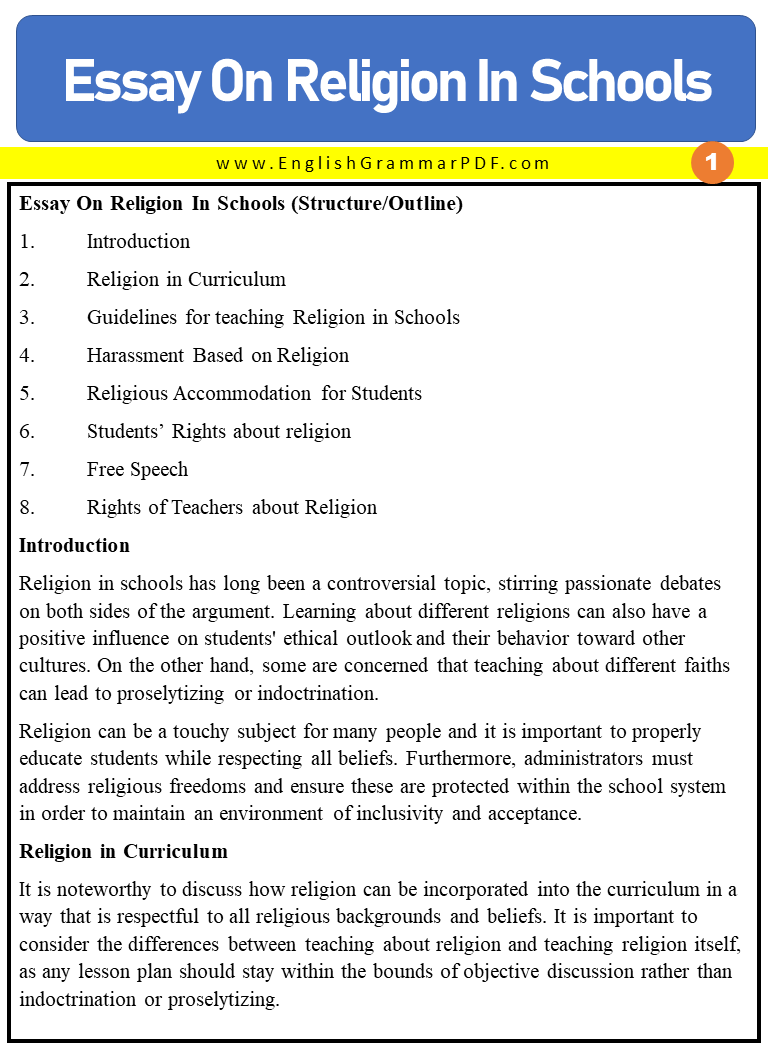
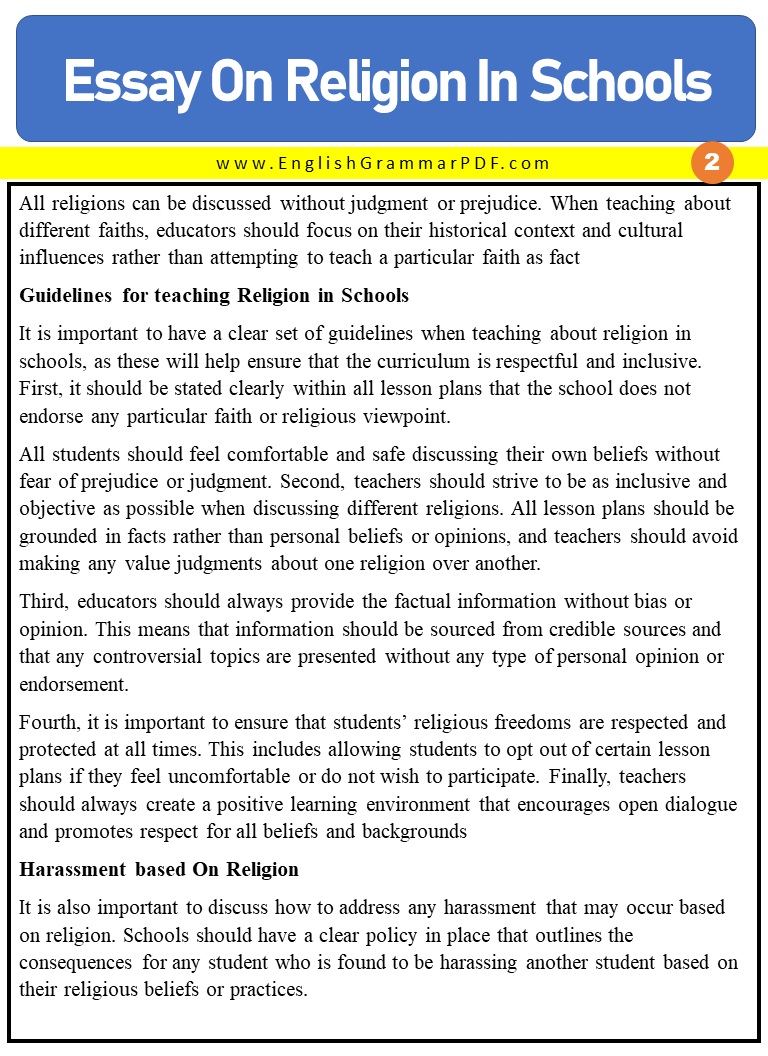
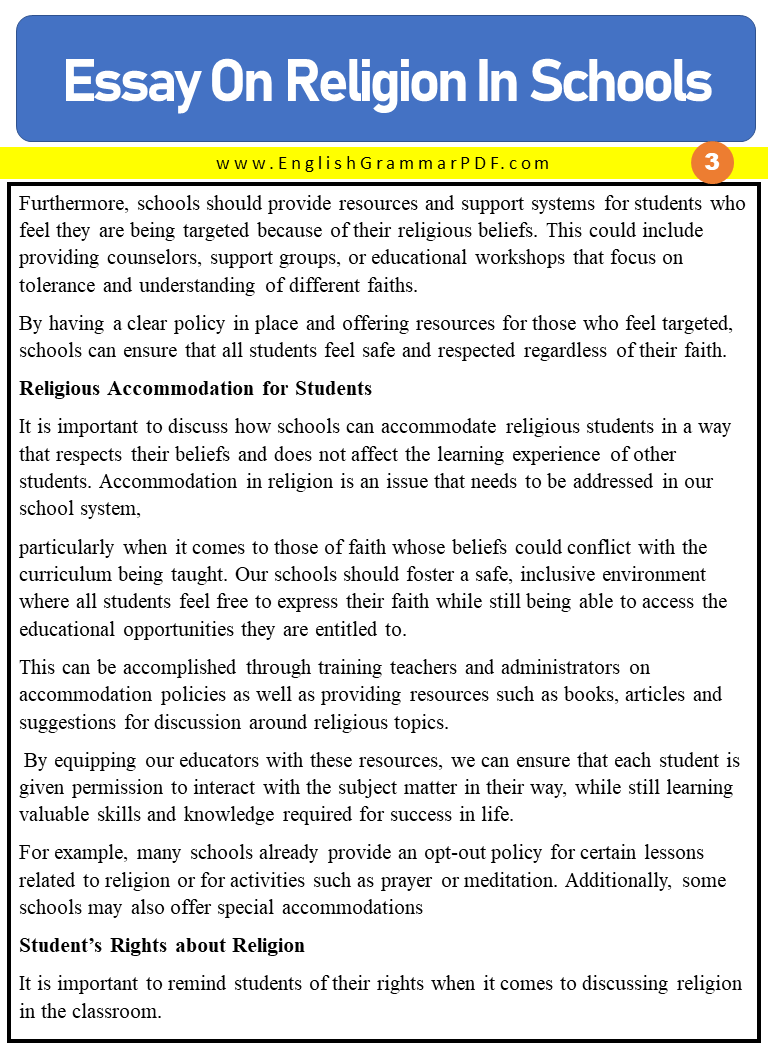
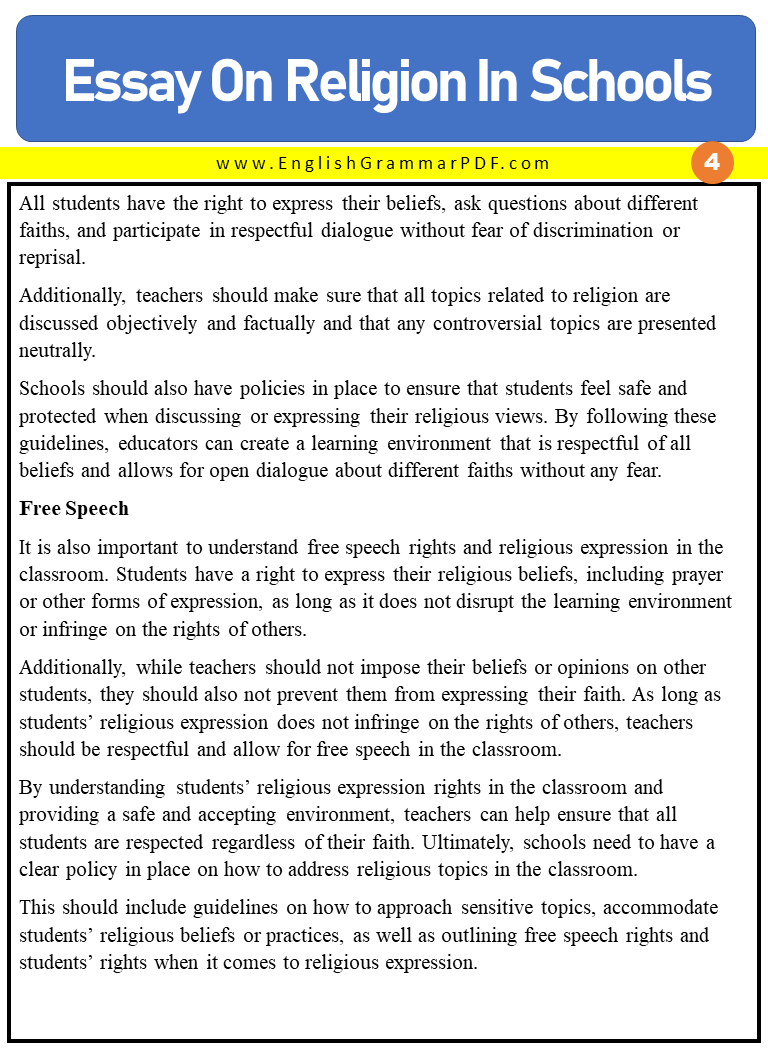
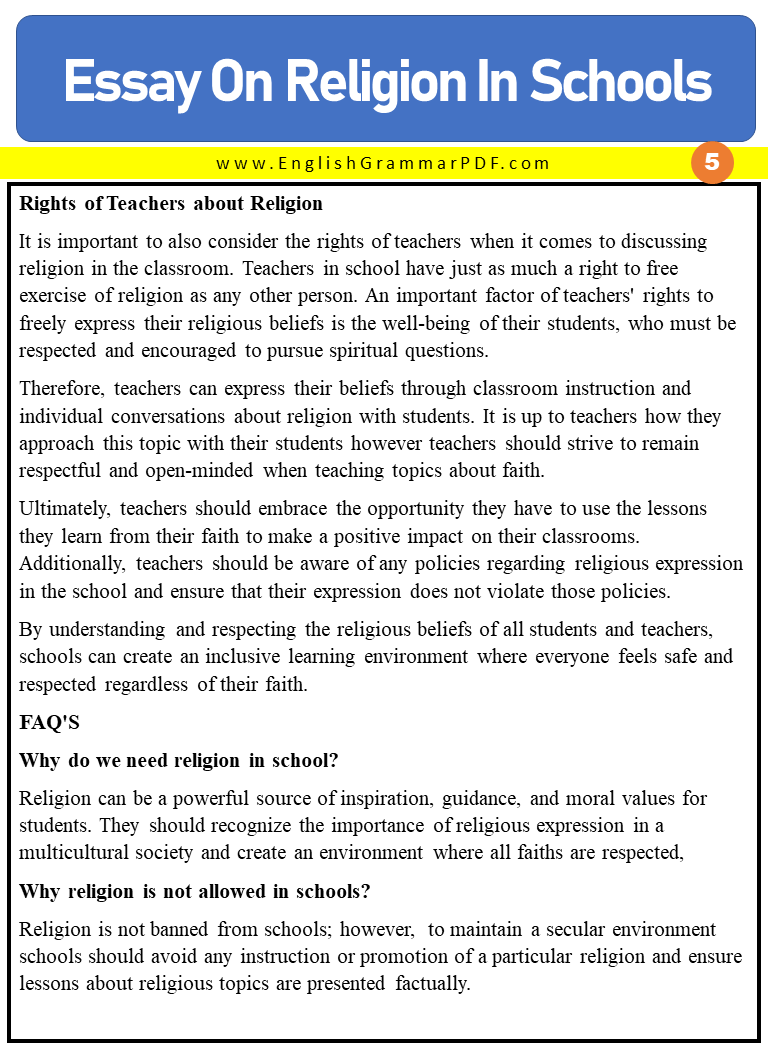
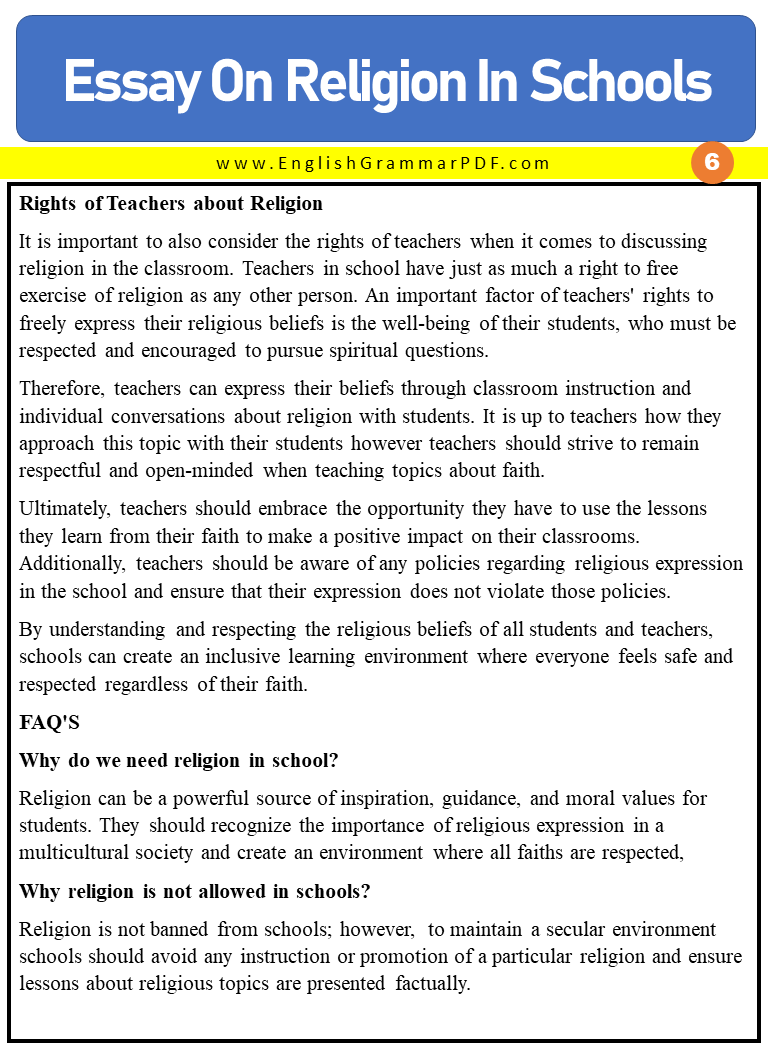
Related: Essay on Reconstruction
Below is the PDF of this Essay.


